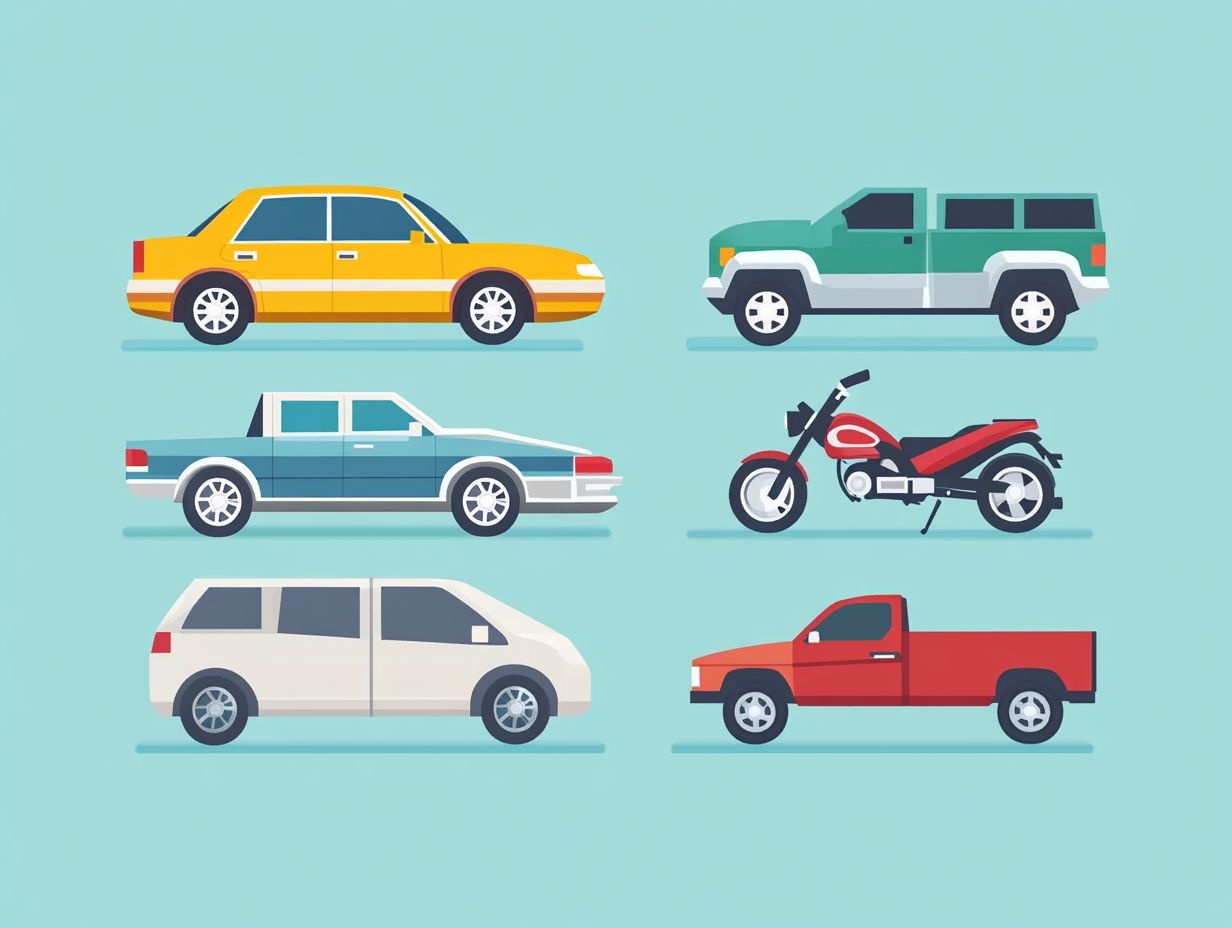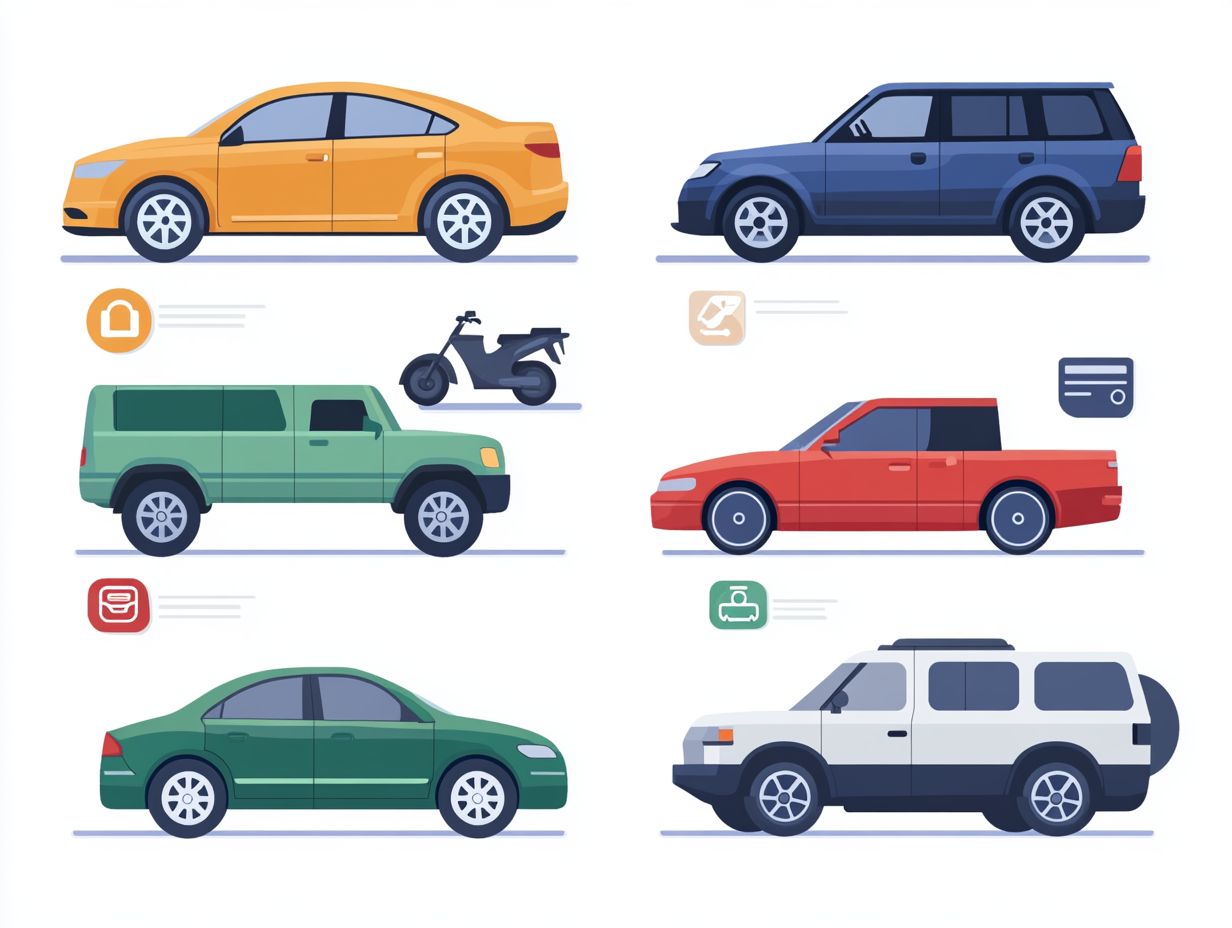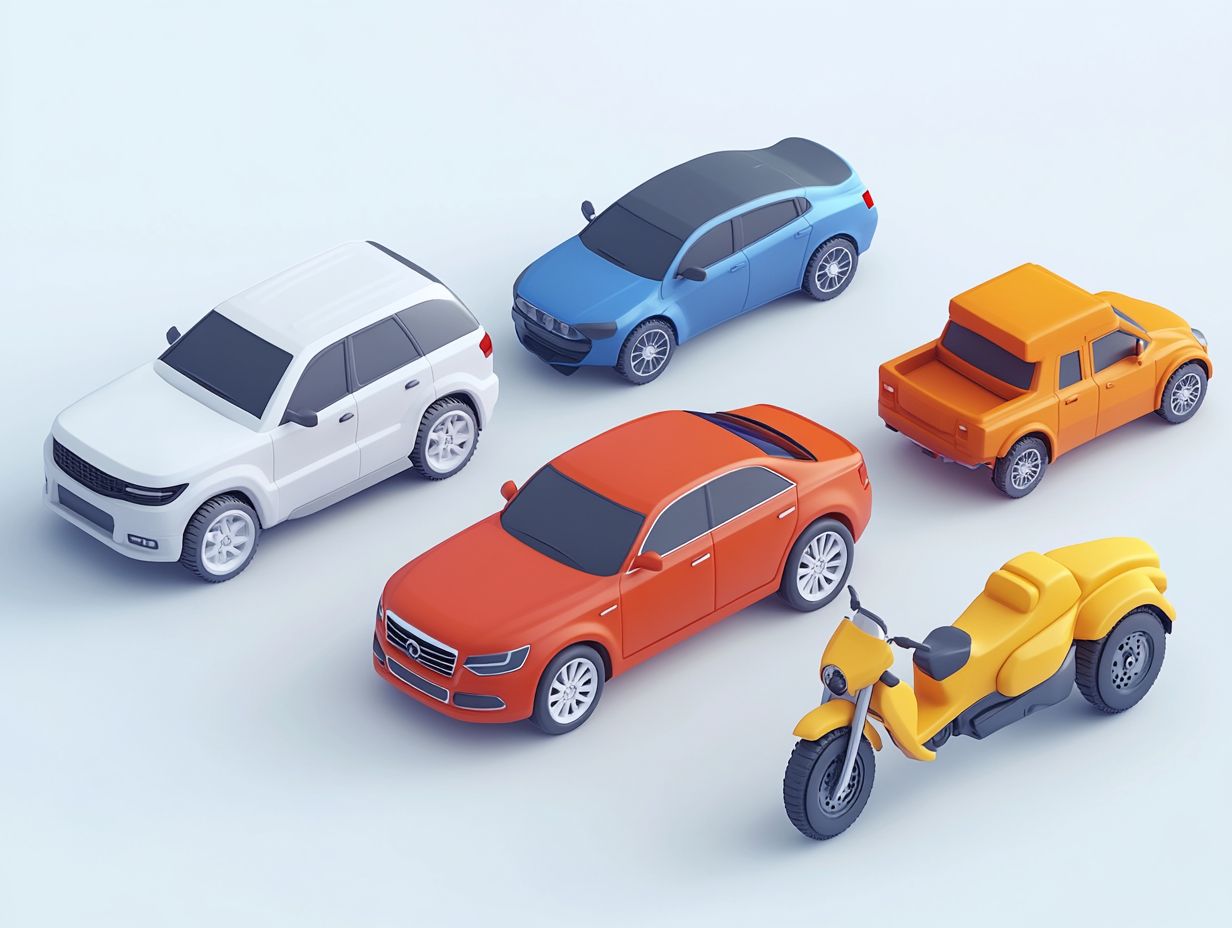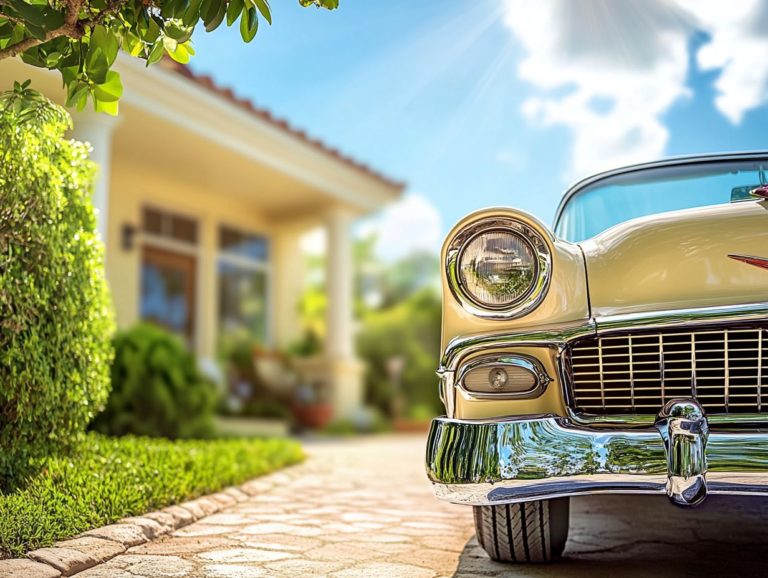The Differences in Coverage for Different Vehicle Types
Choosing the right insurance can be overwhelming. With so many vehicle types available, it s important to understand their unique insurance requirements.
This guide carefully explains the different vehicle types and coverage options available. Get ready to navigate vehicle insurance with clarity and confidence!
Contents
- Key Takeaways:
- Overview of Vehicle Types
- Insurance Coverage for Cars
- Insurance Coverage for Motorcycles
- Insurance Coverage for RVs
- Insurance Coverage for Boats
- Frequently Asked Questions
- What types of vehicles have different coverage options?
- What are the key differences in coverage for these different vehicle types?
- Do all vehicles require the same amount of coverage?
- Are there any coverage options that are specific to certain vehicle types?
- How do I determine the right coverage for my specific vehicle?
- Are there any discounts available for certain vehicle types?
Key Takeaways:

- Car insurance offers a range of coverage options, including liability, collision, and comprehensive, to protect against damages and accidents.
- Motorcycle insurance has similar options, but rates depend on your experience and motorcycle type.
- RV and boat insurance require specific coverage tailored to their needs, influenced by size, age, and intended use.
Overview of Vehicle Types
Understanding different vehicle types, such as cars, motorcycles, RVs, and boats, is essential for making informed insurance decisions. Each vehicle category has its unique characteristics, impacting your liability and comprehensive coverage needs, including coverage for specialized vehicles.
Getting these details right can affect your financial responsibility in accidents and claims. Engaging with insurance professionals will help you find the best accident forgiveness options for your vehicle.
Explanation of Different Vehicle Types
Cars, motorcycles, RVs, and boats each come with their own insurance requirements and risks. Understanding coverage for special interest vehicles helps you identify the specific coverage you need and the liability limits to consider.
If you drive a car, it s smart to choose higher liability limits. This way, you re protected against damages to other vehicles or property in case of an accident.
If you own an RV, you ll likely need enough property damage coverage due to its value and size. This also accounts for the risk of damage while parking or maneuvering.
Motorcycle riders face unique challenges, especially regarding personal injury protection. Given the risks of riding, tailored coverage is crucial.
Insurance Coverage for Cars
Car insurance is essential for protecting your vehicle and financial stability. It offers various coverage options, including liability, comprehensive, and collision coverage.
Understanding these coverage types ensures you’re well-protected against financial setbacks from accidents. Many policies include added features like coverage for event vehicles, uninsured motorists, rental car reimbursement, and gap insurance. Don’t wait until it’s too late to secure your ride!
Types of Coverage Available
Various types of car insurance coverage, such as comprehensive, collision, and liability coverage, offer essential protection against potential risks on the road.
Comprehensive coverage serves as your safeguard against non-collision incidents, effectively covering damages from theft, vandalism, natural disasters, and other unforeseen events. This ensures you have peace of mind behind the wheel.
On the other hand, collision coverage addresses damages from accidents whether you collide with another vehicle or an object allowing you to repair your car without the burden of significant financial strain.
Liability coverage is crucial for protecting you against legal claims that may arise from accidents causing property damage or bodily injury to others. Personal injury protection is a coverage type that pays for medical expenses for you and your passengers after an accident, while medical payments coverage addresses immediate healthcare costs from an accident.
You might also find other valuable options appealing, such as roadside assistance for those unexpected vehicle breakdowns and accident forgiveness policies that prevent premium increases after a minor fender-bender. Together, these options create a more comprehensive safety net for you as a driver.
Factors Affecting Car Insurance Rates

Several factors influence your car insurance rates, including the insurance company you choose, the liability limits you select, and your claims history.
Your individual driving history is crucial; past accidents or traffic violations can significantly impact your premium. Your credit score also plays a pivotal role in assessing risk levels, as many insurers consider financial responsibility as part of their overall evaluation.
The type of vehicle you drive matters too certain makes and models may come with higher insurance costs due to repair expenses or theft rates. Your geographical location also plays a part, as urban areas often experience higher premiums owing to a greater likelihood of accidents.
Navigating these complexities might seem overwhelming. However, talking to an insurance agent can really help you understand your options. They can help you explore tailored choices that strike the right balance between coverage and affordability.
Insurance Coverage for Motorcycles
Motorcycle insurance is essential for you as a rider, providing a range of coverage options like liability, comprehensive, and collision coverage. These protections are designed to safeguard you against the distinctive risks that come with motorcycle accidents.
Given the increased likelihood of serious injuries in collisions, understanding these options now can protect your finances. Engaging with insurance professionals or an experienced agent can empower you to navigate your coverage needs with confidence and clarity.
Motorcycle insurance encompasses essential types of coverage designed to protect you as a rider in various situations, including liability coverage, comprehensive coverage, and collision coverage. Understanding the nuances of each is crucial for safeguarding against unexpected events.
Liability coverage acts as your financial shield, defending you against claims that may arise if you are found responsible for an accident. It covers medical expenses and property damages incurred by others, ensuring you’re not left high and dry.
Comprehensive coverage addresses a range of non-collision incidents think theft, vandalism, and natural disasters offering protection when you’re not riding.
Collision coverage specifically tackles the costs associated with damages from an accident. This allows you to repair or replace your motorcycle without facing overwhelming out-of-pocket expenses.
Lastly, personal injury protection adds an extra layer of peace of mind by covering medical expenses for you and your passengers, underscoring the importance of having a robust safety net while enjoying your ride.
Factors Affecting Motorcycle Insurance Rates
Motorcycle insurance rates are shaped by various factors, including the type of motorcycle you ride, your level of experience, and your history with claims.
If you’re riding a sports bike, you might notice higher premiums due to a greater likelihood of accidents and theft.
In contrast, if you prefer cruisers, you may enjoy more favorable rates. Your experience and accident history are crucial in determining your insurance costs; seasoned riders typically benefit from lower rates because insurers perceive them as less risky.
Geographic location also plays a significant role. If you live in an urban area, you re likely looking at higher rates compared to those in rural settings.
Working with insurance professionals can greatly simplify your search for competitive rates, helping you find coverage that fits both your budget and your specific needs.
Insurance Coverage for RVs
RV insurance is essential for protecting your recreational vehicle, offering a range of coverage options like liability, comprehensive, and collision coverage, all designed to meet your specific needs as an RV owner.
Many policies also include added perks like roadside assistance and personal injury protection, ensuring your safety and peace of mind while on the road.
Talk to insurance experts today to secure the best policy and protect your investment!
Types of Coverage Available

RV insurance encompasses a range of coverage options tailored to protect you from unique risks while traveling.
This comprehensive approach guarantees that you’re shielded from claims related to bodily injury or property damage from accidents, and safeguarded against losses due to theft, vandalism, or natural disasters.
Liability coverage serves as your financial armor, covering expenses related to accidents for which you may be responsible. Comprehensive coverage helps protect against a variety of non-collision incidents, while collision coverage helps pay for damages if you hit another vehicle.
Including roadside assistance in your policy can significantly elevate your travel experience. It offers crucial support in the event of breakdowns or emergencies, ensuring that you remain protected and can continue your journey with confidence.
Factors Affecting RV Insurance Rates
Several factors influence your RV insurance rates, including the type of RV, how you use it, and your claims history with your insurance provider.
The design of your recreational vehicle whether it s a motorhome or a travel trailer plays a significant role in determining your rates.
How often you hit the road also matters; occasional travelers might encounter different premiums compared to those who are constantly on the move.
Geographical location is another critical element; certain areas may present higher risks due to weather patterns or theft rates.
By working closely with knowledgeable insurance professionals, you can navigate these complexities more efficiently, enabling you to secure competitive rates and optimal coverage tailored specifically to your needs.
Insurance Coverage for Boats
Protecting your watercraft with boat insurance is essential for worry-free adventures on the water!
Boat insurance offers a range of coverage options such as liability, comprehensive, and collision coverage, each designed to address the specific risks associated with boating.
Familiarizing yourself with these options can safeguard you against potential financial losses resulting from accidents or damages.
By consulting with insurance professionals, you can ensure that you choose the policy that perfectly aligns with your needs and preferences.
Types of Coverage Available
Boat insurance encompasses a range of essential coverage options, including liability coverage, comprehensive coverage, and collision coverage. Each type is designed to protect you from various risks while on the water.
Liability coverage is particularly significant. It shields you against third-party claims, covering expenses if someone is injured or their property is damaged due to your actions. It’s essential to have this protection when you’re out on the water!
Comprehensive coverage protects you against non-collision incidents like theft, vandalism, or natural disasters, ensuring that unexpected events don t lead to financial turmoil.
Collision coverage is your go-to when your boat sustains damage from an accident. It facilitates repairs or even replacement if necessary.
Personal injury protection is also crucial. It provides medical coverage for injuries to you or your passengers, underscoring the importance of being adequately insured while enjoying your time on the water.
Factors Affecting Boat Insurance Rates
Boat insurance rates can be influenced by a variety of factors, including the type of boat you own, how you use it, and your past insurance claims.
Consider the difference between a sleek sailboat and a robust motorboat; each carries its own set of risks and requires tailored coverage options. The frequency with which you take your boat out also matters significantly. If you re out there often, your premiums might rise due to increased exposure to potential mishaps.
Additionally, geographical factors come into play. Living in an area prone to severe weather or high theft rates can certainly impact your costs.
By consulting with an experienced insurance professional, you can navigate these complexities with ease, ensuring you secure favorable rates that cater specifically to your unique situation.
Frequently Asked Questions

What types of vehicles have different coverage options?
The types of vehicles that have different coverage options include cars, motorcycles, trucks, SUVs, vans, and specialty vehicles.
What are the key differences in coverage for these different vehicle types?
The key differences in coverage for different vehicle types include liability coverage, collision coverage, comprehensive coverage, and understanding coverage for non-standard vehicles such as motorcycles and classic cars, as well as uninsured/underinsured motorist coverage.
Do all vehicles require the same amount of coverage?
No, different vehicles may require different amounts of coverage based on factors such as value, usage, and safety features. For a deeper insight, consider understanding coverage for company vehicles.
Are there any coverage options that are specific to certain vehicle types?
Yes, some vehicles have unique coverage options, such as off-road coverage for recreational vehicles or understanding coverage for limited use vehicles like cargo coverage for commercial trucks.
How do I determine the right coverage for my specific vehicle?
You should consult with your insurance agent or provider to determine the appropriate coverage for personal vehicles based on its type, value, and usage.
Are there any discounts available for certain vehicle types?
Yes, some insurance companies may offer discounts for specific vehicle types, such as safe driver discounts for cars or anti-theft device discounts for motorcycles.
Ready to choose the best coverage for your boat? Contact an insurance agent today!






